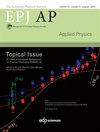Thermohydraulic characteristics and entropy analysis of a novel clockwise and anti-clockwise twisted sinusoidal wavy micro-channel under pulsating inlet condition
IF 0.9
4区 物理与天体物理
Q4 PHYSICS, APPLIED
引用次数: 8
Abstract
Heat transfer performance of microchannel are becoming an important area of research with the current fast growing scenario of high speed computing and miniaturized electronic devices. These devices pile up large amount of heat accompanied by smaller surface area to release it. The current work examines unsteady, laminar flow heat transfer inside a novel twisted sinusoidal wavy microchannel. The channel with square cross section is wavy in nature as well as twisted. The first half portion of the channel is twisted clockwise, whereas the twist in the remaining part is having counterclockwise twist. The novel geometry promotes mixing of fluid layers leading to transport augmentation. The inlet pulsation follows sinusoidal pattern in time. The thermal performance parameter of the proposed novel geometry was assessed within a Reynolds number range of 1–100. Both the pulsation amplitude and Strouhal number are varied during the course of this study. To solve the governing equations, a finite volume based method was utilized. The Nusselt number data shows significant enhancement for the sinusoidal inlet velocity as compared to that of the steady case, i.e. without inlet flow pulsation. The performance enhancement criterion combining heat transfer and pressure drop shows significant improvement over steady flow case as well as for one-way twisted tube. Entropy generation, which is the measure of dissipated energy, is also reported in the present work.一种新型顺、逆时针扭曲正弦波微通道在脉动进口条件下的热液特性及熵分析
随着高速计算和电子器件小型化的快速发展,微通道的传热性能已成为一个重要的研究领域。这些装置可以堆积大量的热量,同时可以用较小的表面积来释放热量。本文研究了一种新型扭曲正弦波微通道内的非定常层流传热。横截面为方形的沟道,既有波浪形,又有扭曲。所述通道的前半部分为顺时针扭转,而所述其余部分中的扭转具有逆时针扭转。新颖的几何结构促进了流体层的混合,从而增加了输运。入口脉动在时间上呈正弦型。所提出的新几何形状的热性能参数在1-100的雷诺数范围内进行了评估。在研究过程中,脉动幅度和斯特罗哈尔数都发生了变化。采用基于有限体积的方法求解控制方程。努塞尔数数据显示,与稳定情况(即没有进口流动脉动)相比,正弦进口速度有显著增强。换热与压降相结合的性能增强准则在稳态工况和单向扭管工况下均有显著改善。熵的产生,这是耗散能量的量度,也报道在本工作中。
本文章由计算机程序翻译,如有差异,请以英文原文为准。
求助全文
约1分钟内获得全文
求助全文
来源期刊
CiteScore
1.90
自引率
10.00%
发文量
84
审稿时长
1.9 months
期刊介绍:
EPJ AP an international journal devoted to the promotion of the recent progresses in all fields of applied physics.
The articles published in EPJ AP span the whole spectrum of applied physics research.

 求助内容:
求助内容: 应助结果提醒方式:
应助结果提醒方式:


